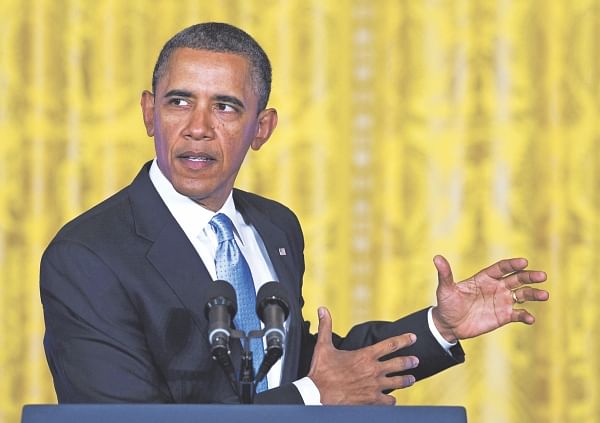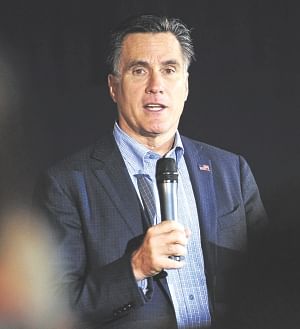Musings

Photo: AFP
When Americans elect their President...
Syed Badrul Ahsan
Mitt Romney, unless something terrible is done to him politically, should end up getting the Republican nomination for the White House later this year. He has made a good showing in Iowa and a better one in New Hampshire. More tellingly, he has won the support of John McCain, who destroyed his presidential hopes four years ago by surging ahead and clinching the right to face Barack Obama on Election Day.
You do not quite know if Romney can actually beat Obama. There are all the surprises which keep coming up at American elections. Someone like Ronald Reagan, intellectually far behind Jimmy Carter, actually stopped the latter from winning a second term in 1980. And yet Reagan gave back confidence to his country, even if that confidence was based on misplaced premises. Back in 1968, the US media kept up the refrain of Mitt Romney's father George Romney, then governor of Michigan, being the frontrunner for the Republican nomination for the presidency that year. Richard Nixon, defeated by John F. Kennedy for the White House in 1960 and then by Pat Brown for the California governorship in 1962, was also in the race. Then Romney went to Vietnam, the aim being to tell American soldiers serving there that he would be a president who would keep their interests uppermost in his policies.
The matter should have stayed there. But then Romney made the mistake of telling the country that American generals had misled him on the actual situation in Vietnam. In other words, the reality was far worse than what he had been told. And that statement did it. Romney's candidacy nosedived. If a prospective president could be brainwashed (and 'brainwashed' is the word George Romney used) by lying generals, power would not be safe in his hands. At the elections in November, it was to be a contest between Nixon and Hubert Humphrey, Lyndon Johnson's vice president. Nixon won by a squeaker. It was a different kind of year, 1968. Eugene McCarthy made waves until Robert Kennedy commandeered his crowds; President Johnson took himself out of the race over Vietnam; Robert Kennedy was murdered and so was Martin Luther King, Jr.
| |
 |
| |
Mitt Romney is expected to get Republican nomination this year. Photo: AFP |
The one certainty you have about American presidential elections is that you cannot be certain who will end up being the occupant of the White House. Before the last election in 2008, everyone knew it would be Hillary Clinton who would go to the White House, despite all the bruises she was getting from the media and other interest groups. No one ever imagined that a senator then only in his first term would come forth to destroy the mighty Clinton machine and magically become president. But that is precisely what Barack Obama did. It is, of course, another matter whether he can win re-election. The economy keeps pushing him down.
American presidential elections have sometimes been notorious for the way they have progressed. Good, intellectual men like Adlai Stevenson have lost elections despite their brilliance of mind. Dwight Eisenhower, a great general during World War Two but an unimaginative Cold War politician, beat Stevenson twice in the race for the White House. And then there have been some other men who have stubbornly kept on being candidates without getting anywhere much. Harold Stassen went on seeking the Republican nomination for years on end. Unfortunately for him, no one noticed him much. Alabama's George Wallace almost threw the 1968 election into chaos with his strong showing. Had he been stronger than the thirteen per cent of the votes he eventually got, the election would have been thrown into the senate, which had a Democratic majority, and Humphrey, despite securing fewer votes than Nixon, would have become president.
There are all the names we have not forgotten. William Scranton wanted to be president as well and so did Nelson Rockefeller. The latter became, towards the end of his life, vice president under Gerald Ford. There was once a time when people thought Rockefeller would make it to the White House and turn America towards a high degree of liberalism. It did not happen that way. Both Estes Kefauver and John Kennedy wished to be vice president under Stevenson in 1956. In the event, Kefauver was chosen as the nominee for the job under Adlai Stevenson. And then he and Stevenson went on to lose the election. The irony, which would not be talked about at all, is that it was Kennedy, as president, who would appoint Stevenson as America's permanent representative at the United Nation.
Elections, especially in the west, are interesting affairs. On a more elevated level, their purpose is to sift through the experience of a candidate especially through the primaries. And many have been the souls to perish in their forlorn hope for the nomination.
By the way, do you remember how Edmund Muskie lost his chances of winning the presidency in 1972? After the media had written some nasty things about his wife, he broke down before the media. And that was the end of his presidential hopes. A pity.
The writer is Executive Editor, The Daily Star.